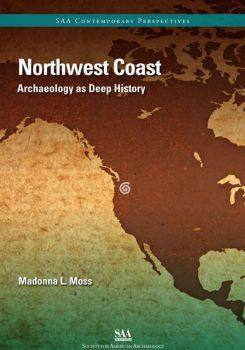
Publisher:
Bonnie King
CONTACT:
Newsroom@Salem-news.com
Advertising:
Adsales@Salem-news.com

~Truth~
~Justice~
~Peace~
TJP
Nov-09-2011 14:31

 TweetFollow @OregonNews
TweetFollow @OregonNews
Northwest natives were fishers, not hunter-gatherers
Salem-News.comIn two new books, the University of Oregon's Madonna Moss challenges conventional thinking about the region's early inhabitants, pointing to cultures built around fishing, fish processing and fish resource management.
 Madonna L. Moss |
(EUGENE, Ore.) - Native people of the Pacific Northwest were fishermen and food producers, as well as stewards of their environment who timed their fishing practices to promote the production of salmon and the other fish that they relied on. They were not simply hunter-gatherers, says University of Oregon archaeologist Madonna L. Moss.
Moss takes aim at the label "hunter-gatherer," writing in chapter three of her new book "Northwest Coast: Archaeology as Deep History" (Society for American Archaeology Press) that the "moniker has outlived its utility" for the people who inhabited the land from Alaska to Oregon long before European explorers arrived.
Moss, who has studied the Northwest since the mid-1970s, provides readers with an overview -- in easy-to-read language -- of what researchers have discovered at archaeological sites dating back more than 12,000 years. Most sites, she notes, are rich in fish remains. And many more sites, she says, likely have been buried by rising sea levels and never will be found.
"Most of what makes up these sites are faunal remains [animal bones and shells]. Most of the bones in these sites are fish bones. This book is about the 85 percent fish bones that make up these sites and what they can tell us about the people who lived here in the past," Moss said in an interview. It doesn't make sense for archaeologists to refer to early people of the Northwest coast as hunters-gatherers anymore, not even as complex hunter-gatherers. These people were fishers. They were fishermen. They knew how to process fish, live on fish. Local tribes often are confused by the term 'hunter-gatherer.' They have always thought of themselves as fishermen."
 |
Future research, she argues, should focus on fish remains. "Whereas salmon are the most widely known, Pacific cod and other codfishes, rockfish, lingcod, greenlings, herring, flatfish, surfperch and sculpins are common," she writes.
The focus on fish is expanded greatly in a second book, "The Archaeology of North Pacific Fisheries," co-edited by Moss and Aubrey Cannon, an anthropologist at Canada's McMaster University. This 18-chapter book, published by the University of Alaska Press, looks in depth at fish remains found at numerous archaeological sites in the Northwest.
"The Archaeology of North Pacific Fisheries" provides an overview of studies done from Alaska to British Columbia to Puget Sound, and draws heavily from the descendents of the early inhabitants. Most of the authors are zooarchaeologists -- those who study animal remains but also focus on fish bones. The book extensively covers salmon-related discoveries and touches on lesser-known species that have been found. The book is aimed at their colleagues involved in environmental science, fisheries and resource managers.
"Northwest Coast" is barely 150 pages of text -- seven chapters that covers archaeology and anthropological discoveries, as well as walk readers through the key time periods in an effort to help general readers appreciate the complexity of the region's early inhabitants and their reliance and dedication to fishing. Only chapter six, "The Late Holocene Mosaic," might be considered a challenge to read, Moss says, but chapters three through six will especially appeal to readers interested in early settlements in the Northwest.
Fish records, Moss says, should be seen as archives of information to use in dealing with the environmental crises that are coming amid climate changes.
The two books combine to make a point that clearly surfaces early in "Northwest Coast" -- that cooperation with Native peoples is the key to archaeological research in the region. In "Northwest Coast's opening chapter, Moss compares the find of "Kennewick Man" in eastern Washington, where Umatilla tribal members were not respected and brought into the discovery early on, to the quietly unfolding story of the 10,300-year-old human remains found near Klawock, Alaska, where local tribes were invited to be partners as work progressed. The two discoveries unfolded within weeks of each other in 1996.
It is hoped, Moss says, that readers will think differently about the evolution of cultural complexity. "I think people were complex 12,000 years ago," she said. "The indigenous people of the Northwest coast not only relied on fish, sea mammals and plants, they utilized resources -- practices, techniques and technologies -- that actually enhanced the biological productivity of this region," Moss said. "I would argue that their practices made it more productive than it would have been without any human presence."
About the University of Oregon
The University of Oregon is among the 108 institutions chosen from 4,633 U.S. universities for top-tier designation of "Very High Research Activity" in the 2010 Carnegie Classification of Institutions of Higher Education. The UO also is one of two Pacific Northwest members of the Association of American Universities.
Articles for November 8, 2011 | Articles for November 9, 2011 | Articles for November 10, 2011

Quick Links
DINING
Willamette UniversityGoudy Commons Cafe
Dine on the Queen
Willamette Queen Sternwheeler
MUST SEE SALEM
Oregon Capitol ToursCapitol History Gateway
Willamette River Ride
Willamette Queen Sternwheeler
Historic Home Tours:
Deepwood Museum
The Bush House
Gaiety Hollow Garden
AUCTIONS - APPRAISALS
Auction Masters & AppraisalsCONSTRUCTION SERVICES
Roofing and ContractingSheridan, Ore.
ONLINE SHOPPING
Special Occasion DressesAdvertise with Salem-News
Contact:AdSales@Salem-News.com
googlec507860f6901db00.html

Salem-News.com:

Terms of Service | Privacy Policy
All comments and messages are approved by people and self promotional links or unacceptable comments are denied.
Anonymous November 10, 2011 2:18 pm (Pacific time)
Jeff other than a few undergraduate courses in NW Geology and some brief seminars in NW cultural Anthro, I know very little about the Northwest Indian Tribes, or how many there were now, or over time. It has been my observation that though there is a lot of facts incorporated in "folklore", and all cultures around the world have their specific folklore, they are not very accurate as time goes by. None of the tribes had a written language in this area, like you found in other parts of the world, so some folklore does have a written record to augment it's accuracy. That is not to diminish anyone's history, we all should be proud of what our's is. Regarding Europeans leaning from the NW Tribes as per their "potlatch system" as you suggest, are you not familiar with the technology in fishing and agriculture the Europeans began developing thousands of years ago? If not, you could find writings on it going back over 5,000 years ago, and not something carved onto rock.
passit November 10, 2011 12:40 pm (Pacific time)
I thnk the term "fishing" used here by Ms Moss is being redefined to apply to poeples who enhanced fish populations, ,uch like farmers do for agriculture. They promote it, whereas hunter-gatherer seems void of any proactive means to maintain food supplies but instead relies on what nature provides. As to the mythmaker, lots of societies had slaves, that didn't stop them from being complex societies. The mayans were always at war, look at their buildings. Russian, Spanish and French observations made before Lewis and Clark are probably no better than Lewis and Clark. They are biased, Ms Moss is using archaeology to change those biases.
Jeff November 10, 2011 5:51 am (Pacific time)
"MYTHMAKING" seems to think that the Eurocentric observations of very biased non-scientific explorers should trump tribal lore and scientific corroboration in the bid for "truth." But it is simply the White Man's MYTH, nothing more. I met Madonna Moss a couple of decades ago while on a research trip with Dale Croes, and her approach was quiet, astute and (especially regarding tribal lore and archaeology) respectful even then. If MYTHMAKING doesn't want to read her book, I suggest he at least stick to people who know whereof they speak. The potlatch system was one of the most sophisticated systems for protecting fragile resources ever devised; the Europeans could have learned a lot from it, but chose not to.
zornwil November 9, 2011 10:46 pm (Pacific time)
To the prior comment entitled "MYTHMAKING," please read the article more carefully. This is prehistorical, regarding "the people who inhabited the land from Alaska to Oregon long before European explorers arrived." And even if/as what you say may well be true (I'm not versed enough either way to say), that has nothing to do with 10,000 years ago. Cultures change for a large number of reasons. And of course the observations of any people from a drastically different culture, as we have seen from more modern examples, is hardly not to be challenged, either, but that really is neither here nor there when you're speaking about such an ancient record.
I didn't even grew up in the northwest and had learned 40 years ago, as a child, that the northwestern coastal tribes subsisted largely from fishing. Though of course that was just casual grade school learning, so who knows how accurate such was in terms of in-depth academic thinking on the topic back then.
As to the term "hunter-gatherer," it seems absurd to me to reject that label for fishing. Fishing is merely a subset of hunter-gatherer - fishing is hunting. I don't understand the concern with the label, which has referred for quite a long time to the pre-agrarian state of peoples and their activities of living off of flora and fauna without creating fixed tracts of agriculture and harvesting and so forth.
Anonymous November 9, 2011 5:57 pm (Pacific time)
MYTHMAKING. May I suggest Ms. Moss, if she is not versed in reading Russian, Spanish French, then have someone translate observational journals on the type of tribal cultural/activity that was being pursued long before Lewis and Clark came to the Northwest, and up until the present. There were some small areas of fishing commerce (Columbia and a few coastal spots), but that is a global activity. The Northwest Indian tribes, and there were many, were often at war with each other, often taking slaves. They actually did very little in developing a stable food supply and often starvation was a reality that kept their population down. They were not very successful, and now they make myths that the Whiteman caused thm to go into poverty. Wrong.
[Return to Top]©2026 Salem-News.com. All opinions expressed in this article are those of the author and do not necessarily reflect those of Salem-News.com.